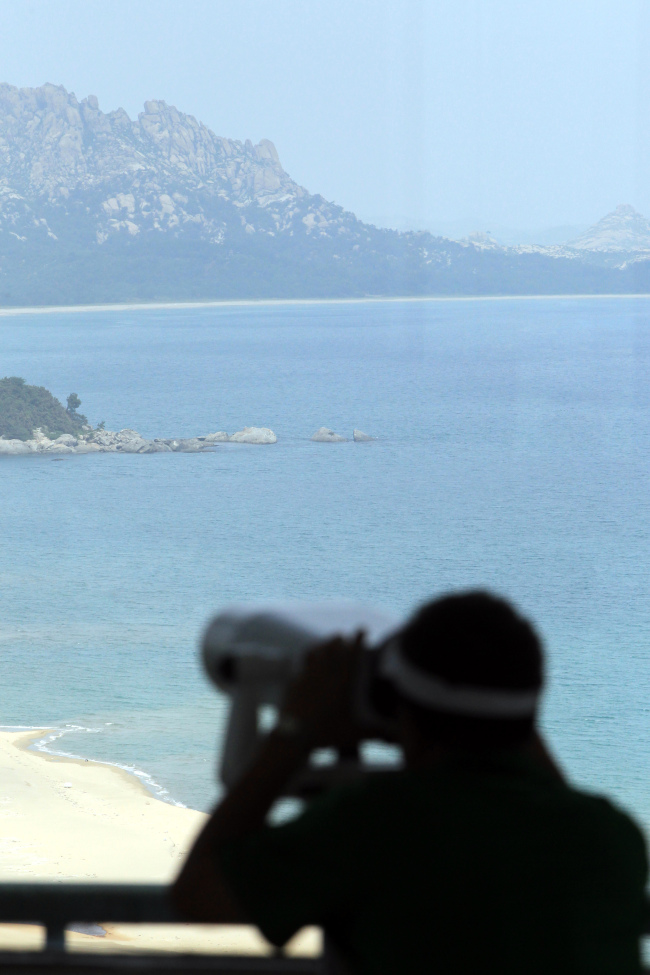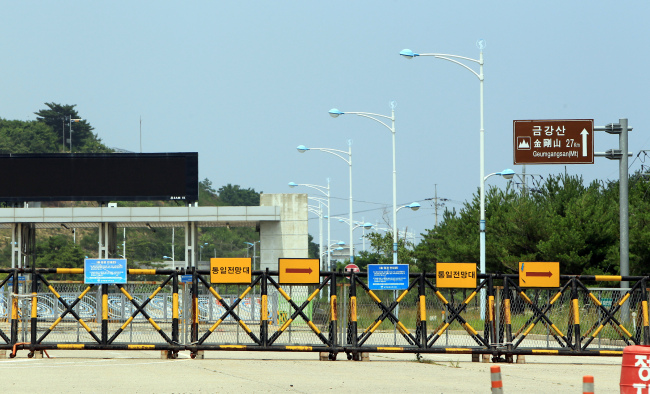Six years since operations ceased, the stalled tours to Mount Geumgangsan in North Korea are deepening the despair of program operators, shop owners and residents.
Revenue sources have dried up and local communities have lost their vigor while cross-border ties are showing no sign of a thaw.
Touted as an icon of inter-Korean rapprochement, the program was launched in 1998 and fetched more than 2 million visitors from the South until it was halted after a tourist was shot dead by a North Korean soldier when she strayed into an off-limits area in July 2008.
 |
A tourist looks at Mount Geumgangsan in North Korea through a telescope at the Unification Observatory in Goseong, Gangwon Province, Thursday. (Yonhap) |
Seoul has been demanding a formal apology and measures to preclude a relapse and to ensure the safety of its people.
With Pyongyang’s resistance, however, the once-lucrative business has gone downhill rapidly.
Hyundai Asan Corp., the project’s exclusive operator, has reportedly scaled back its entire workforce by nearly 72 percent to 305 over the past six years. It has also shed about 75 percent of its tourism and economic cooperation staff to 61.
The figures are staggering given that during the boom some 620 workers were dispatched to hotels, restaurants and other facilities in the mountain resort alone.
“The personnel reconfiguration was inevitable for reorganization and work coordination essential for the company’s survival,” Hyundai Asan said as it placed 30 additional employees, or 10 percent of the total, on the three-month waiting list last month.
The Seoul-based firm is expected to have recorded a total of nearly 870 billion won ($850 million) in losses from the suspension of tours ― a sum that includes its shortfalls resulting from the temporary closing of the inter-Korean factory park in Gaeseong.
To avert a liquidity crunch, it has increased its capital by 70.8 billion in five installments, while gradually trimming annual operating losses from 32.3 billion won in 2009 to 9.2 billion won in 2013 through internal restructuring, construction projects and small-scale domestic tours.
The protracted doldrums were felt across the small border towns on the east coast.
The roads to Mount Geumgangsan, which years ago brimmed with restaurants and stores selling dried fish and souvenirs, were serene and desolate.
Many shops were shut. Passing once in a while were vehicles from nearby Army units and visitors to the northernmost Unification Observatory, but few of them stopped alogn the way.
“I’m lucky to have workers from a construction site in the neighborhood,” a restaurant owner in Goseong, Gangwon Province, told Yonhap.
 |
The departure gate is shut at an inter-Korean transit office in Goseong, Gangwon Province, Thursday. (Yonhap) |
“I remember how I was busy all day long when Geumgang tours were in their heyday. But now I close the door when the construction workers leave. … I hope things will get a little better as the summer vacation season begins.”
A 50-something owner of a driedfish store in the vicinity surnamed Park said the prolonged slump intensified her family’s hardships and dampened the overall mood in the town.
“We couldn’t scrape a living with this business so my husband has gotten a temporary construction job,” Park said. “The tours will hopefully restart as soon as possible.”
On Friday, Rep. Shim Jae-kwon and 34 other members of the main opposition New Politics Alliance for Democracy issued a statement urging President Park Geun-hye to make efforts to revive the tour program through dialogue in line with her drive for unification.
The statement came a day after the Mt. Kumgang Entrepreneurs Association, a guild of Hyundai Asan contractors for the tour project, claimed that their collective losses had reached 1 trillion won.
“Too long a time has passed to bear all the pain,” its members said at a news conference in Seoul. “Now is the time for a fundamental resolution rather than palliative assistance.”
Back in 2009, Hyundai Group chairwoman Hyun Jeong-eun traveled to Pyongyang to meet then-leader Kim Jong-il and secured a guarantee of tourist safety and “all accommodations necessary for the tour.”
But then the Lee Myung-bak government dismissed the promise as not made to “responsible government authorities.”
The dynamics surrounding the program’s resumption have since become more complicated.
After the North’s 2010 attacks on the South’s Cheonan corvette and Yeonpyeongdo Island, the Lee administration slapped bans on cross-border trade, investment, travel and other economic and personnel exchanges, further darkening the tour’s future.
Public sentiment has also soured toward providing economic benefits to the communist neighbor in the wake of a series of missile and nuclear tests.
Concerns also persist about a possible diversion of tour revenues for military uses that may constitute a breach of a U.N. Security Council resolution imposed after Pyongyang’s third atomic experiment last year.
Seoul stressed the need for clear safeguards for its tourists, as well as an assurance that any reopening of the tour would not violate international sanctions.
“Our stance is that for the tour’s resumption the tourist safety issue must be resolved first and foremost,” ministry spokesman Kim Eui-do told reporters on Friday.
“There should also be the government’s judgment or position that the (the tour and a relaxing of the bilateral May 24 sanctions) do not fall under the U.N. sanctions.”
Unification Minister Ryoo Kihl-jae said at a parliamentary session that Pyongyang should take action first: “We will be able to lift the sanctions if the North takes responsible steps through dialogue with us on an appropriate occasion.”
The North has proposed talks over Geumgang tours, while calling for an easing of the May 24 sanctions in the face of emptying coffers and dwindling outside assistance.
For Pyongyang, the project was a precious source of hard currency, bringing some $40 million a year, which is nearly half of what 50,000 North Korean workers earn together at the Gaeseong industrial complex.
After the collapse of talks in February 2010, the North froze and confiscated South Korean assets there and forced out staff. It has since made the resort a special tourism zone and attempted to run it independently or together with China and other countries, but the efforts have made little headway.
Businesspeople hope that North Korea’s planned participation in the upcoming Asian Games in Incheon will help improve cross-border relations and set the stage for the resumption of the long-stalled program.
“It is not just North Korea that loses out on the suspension,” said Kim Hee-joo, head of the entrepreneurs union. “The two countries’ relations can be developed when the Geumgang tour issue is resolved so as to usher in an era of inter-Korean rapprochement.”
By Shin Hyon-hee (
heeshin@heraldcorp.com)









